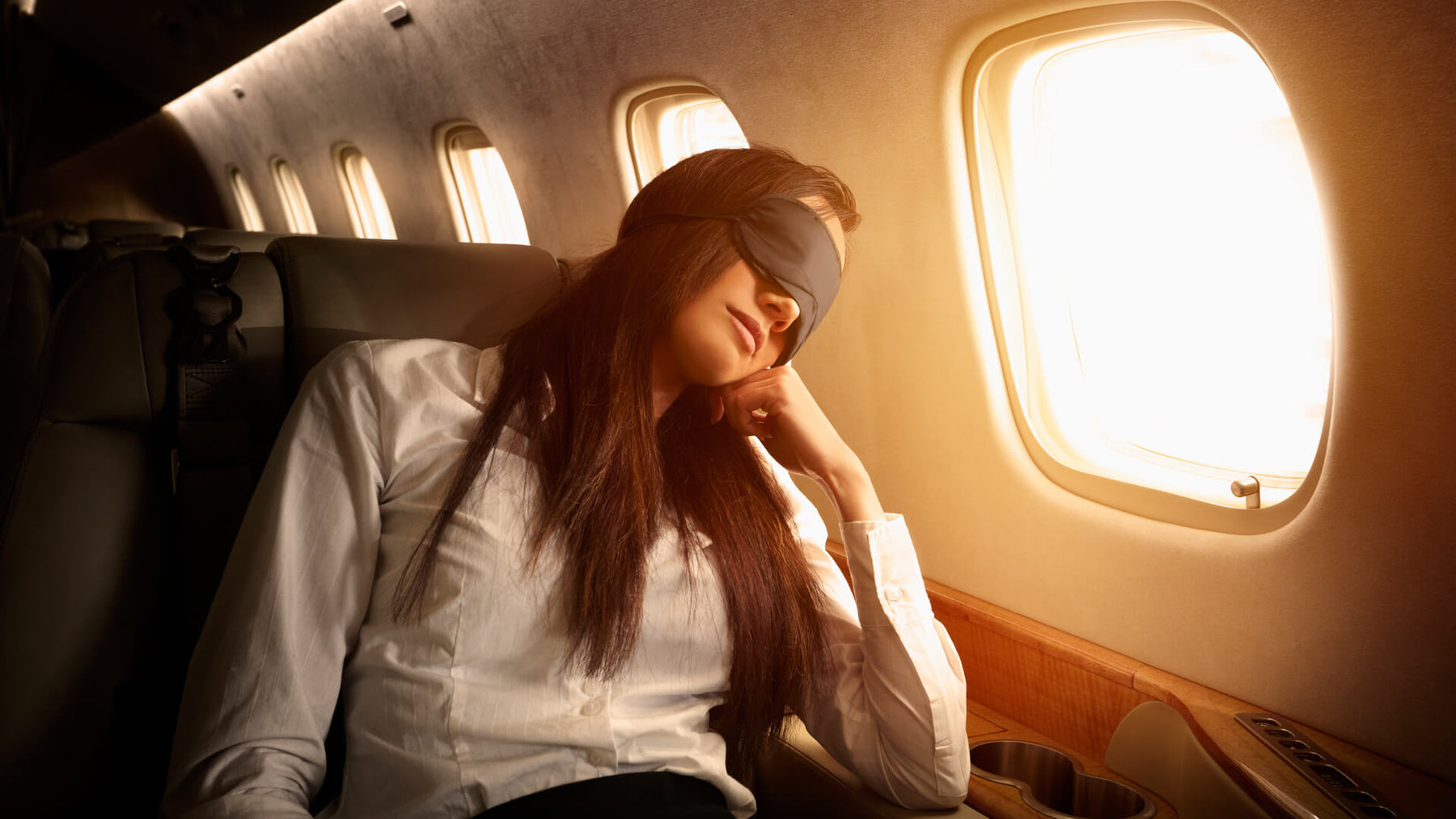
What are the Best Sleep Aids For Travel?
When it comes to getting a good night's sleep while travelling, natural sleep aids can be your best companions. Imagine stepping off a plane or driving into a new time zone and catching those essentials.
Your body has a natural rhythm called the circadian window, which urges you to sleep between 11 p.m. and 7 a.m. However, travel disrupts this internal clock, especially across different time zones.
Enter natural sleep aids These are like gentle lullabies for your body, helping it adjust to new environments and time zones. Simple yet effective, these aids often include herbs like chamomile, known for its calming properties, or essential oils such as lavender to soothe your senses.
Melatonin, a natural hormone, also plays a role, signaling your body that it's time to wind down.
Avoid Jetlag And Sleep Strategically During Travel

Three days before travel, start adjusting your bedtime gradually. Move it an hour earlier (or later) than usual on the first night, then add another hour on the second evening and a third hour on the third day.
Your body takes about one day per time zone to adapt. So, planning and making these gradual changes can make the transition smoother for your body as you prepare to travel.
Tackle Travel Fatigue With These Natural Sleep Helpers

Combat travel fatigue effortlessly by incorporating natural sleep aids into your routine. It's common to feel tired and restless when on the move, but these natural sleep helpers can be your secret weapon. Imagine the soothing power of herbal teas like chamomile or the calming essence of lavender oil.
Even melatonin, a natural hormone, can signal your body that it's time to wind down. These gentle remedies harmonize with your body's natural rhythms, ensuring a more restful sleep.
From cozy herbal teas before bedtime to the portable convenience of essential oils, these natural sleep aids make tackling travel fatigue a breeze. So, the next time you embark on a journey, consider these allies to explore the world and ensure you wake up refreshed and ready for your adventures.
How To Use Natural Sleep Aids for Better Journeys

For better journeys, learn how to use natural sleep aids. Picture this: you're on the road, and a good night's sleep feels like a luxury. Well, here's your guide to making it a reality. Start with simple practices, like sipping calming herbal teas such as chamomile before bedtime.
Essential oils, like lavender, can be your travel-sized sleep companions; just a few drops on your pillow work wonders. Embrace melatonin, a natural hormone, to signal your body that it's time to wind down.
The key is to integrate these natural remedies into your routine, aligning with your body's internal clock. So, whether on a plane, train, or in a new time zone, these natural sleep aids can be your allies for a journey filled with restful nights and energized days.
Take Melatonin For Better Sleep

Your body usually increases melatonin, a sleep hormone, about two hours before bedtime to prepare for rest. However, melatonin might need a boost when you're traveling and your routine is disrupted. Melatonin is a non-prescription sleep aid in doses up to 10 milligrams.
Taking melatonin helps your body generate natural melatonin at the right time, especially when your schedule is thrown off. It's important to note that melatonin isn't a magical fix for overcoming jet lag.
Research suggests that exposure to light during the day is more effective in resetting your internal clock, according to Charlene Gemalto. So, while melatonin can be helpful, combining it with exposure to natural light is a smart approach to tackling time zone adjustments.
How Do You Take Melatonin For Travel

Sleep is good for your body's circadian rhythms and the homeostatic sleep drive. Now, here's where melatonin steps into the spotlight.
This gland works hard, whipping melatonin daily to sync with the internal circadian clock. Picture it as the conductor of your sleep and wake routine. Melatonin isn't just a backstage player; you can also find it in everyday foods like meats, grains, fruits, and veggies.
So, whether it's a natural melatonin boost from your plate or a supplement, this hormone is your body's way of saying, "Time to hit the hay."
FAQ’s
How can I get a good night's sleep while traveling?
Ensure a good night's sleep while traveling, maintain a consistent sleep schedule, create a comfortable sleep environment, and consider using natural sleep aids such as melatonin or calming teas.
Additionally, stay hydrated, limit caffeine and screen time before bed, and expose yourself to natural light during the day to help regulate your body's internal clock.
Why is it hard to sleep when traveling?
Sleeping while traveling can be tricky because your body has this internal clock, and when you switch time zones, it needs clarification. It's called jet lag, and it messes with your sleep routine.
New places, strange beds, and all the travel stress don't help either. Sometimes, it's the altitude, the noise, or everything's different. It's like your sleep system takes a vacation.
What is the travel pill for sleep?
You wouldn't want your body urging you to sleep while weaving through a bustling foreign airport. Enter ZzzQuil Pure Zzzs Melatonin, your natural sleep buddy. It collaborates seamlessly with your body to make falling asleep a breeze.

Leave a comment